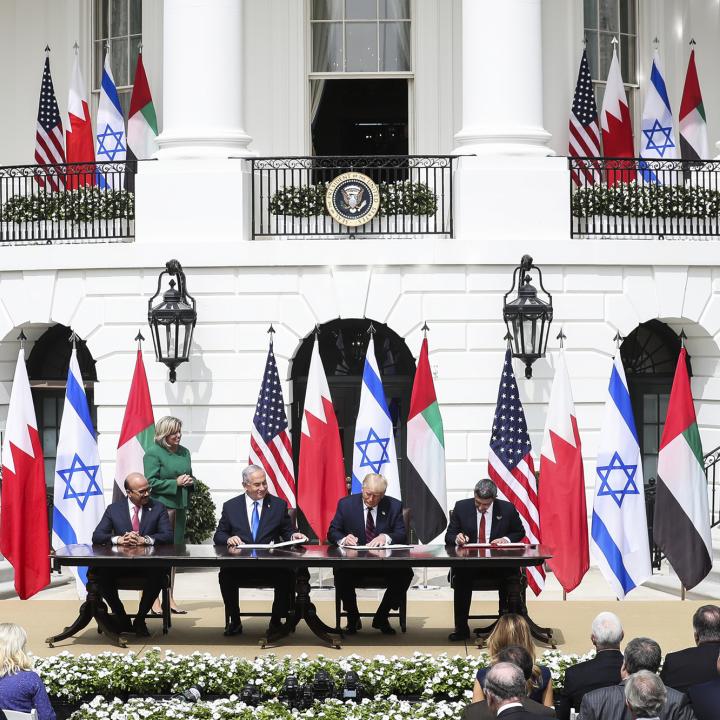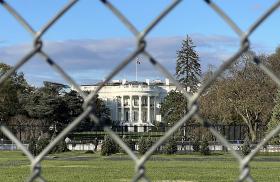
- Policy Analysis
- PolicyWatch 4104
The Abraham Accords at Five Years: Resilience and Roadblocks

A panel of former ambassadors and decorated journalists discuss the impact of the landmark normalization agreement and what its future holds given ongoing hostilities in Gaza and growing Arab-Israeli diplomatic turmoil.
On September 11, The Washington Institute held a virtual Policy Forum to mark the publication of “Resilience and Roadblocks: The Abraham Accords at Five Years,” a new study by Ziegler Distinguished Fellow David Makovsky. Other speakers on the panel included: Yael Lempert, the former U.S. ambassador to Jordan and current vice president for outreach at the Middle East Institute; Amir Hayek, Israel’s inaugural ambassador to the United Arab Emirates and a nonresident senior fellow at the Atlantic Council’s N7 Initiative; Victoria Coates, the former deputy national security advisor to President Trump and vice president of the Heritage Foundation’s Davis Institute for National Security and Foreign Policy; and Ahdeya al-Sayed, and award-winning reporter and media advisor who formerly served as president of the Bahraini Journalists Association. The following is a rapporteurs’ summary of their remarks.
David Makovsky
In the five years since the Abraham Accords were launched in 2020, economic and security coordination between the signatories has grown substantially, opening a new chapter in Arab-Israel relations. To be sure, the Gaza war ushered in major regional instability that has soured public sentiment across the region and paused further efforts toward normalization, most notably with Saudi Arabia. Yet none of the signatories has suspended or withdrawn from the accords, and quiet engagement has continued.
To expand regional integration amid these troubled waters, the United States should engage critically with initiatives like the India-Middle East-Europe Economic Corridor (IMEC) and the Negev Forum. It should also take initial steps toward wider peace by shepherding Syrian and Lebanese nonbelligerency deals with Israel. Moreover, Washington should understand—and make clear to others—that the Abraham Accords will not survive (let alone expand) if Israel resorts to unilateral annexations in the West Bank or forced displacement of Palestinians from the Gaza Strip.
Yael Lempert
The impact and aftermath of October 7 have reverberated around the region, making further progress on normalization more complicated. They have also underscored how the domestic and strategic interests of key regional players are still deeply intertwined with the Israeli-Palestinian conflict. The vision of an integrated Middle East will not be fully realizable without a pragmatic vision for resolving this conflict in a way that includes a viable future Palestine. This intertwining was evident during the Negev Forum discussions in 2022-23, when Arab partners were focused on how the Palestinians could benefit from regional initiatives on food, water, health, and business.
Notably, neither side seems to understand the full impact of what has happened over the past two years. The Arab world generally fails to appreciate just how deeply October 7 affected the Israeli psyche, while most Israelis do not seem to recognize the Gaza war’s impact on both Palestinians and the wider regional psyche. For example, Jordanian views of Israel are shaped by familial ties and cultural connections to Palestinians, so events like the Gaza war, Jewish settler violence in the West Bank, and the wars of past generations are all deeply personal. As such, resolving the future of Palestine is fundamental to improving people-to-people connections between Israelis and Jordanians; the same goes for other Arab populations.
Israel’s strike on Hamas leaders in Qatar will further strain these relations, with reaction statements from the United Arab Emirates and Saudi Arabia highlighting the volatility of the moment. Regional integration will remain on hold until the Gaza war ends, the hostages are returned, and the parties find a viable path toward reconstruction and governance in the Strip—and toward an enduring resolution of the Israeli-Palestinian conflict.
Amir Hayek
Despite the war’s geopolitical challenges, economic interaction remains critical to encouraging further regional integration. Economic relations between Israel and the United Arab Emirates have endured and shown strength, with bilateral trade valued at around $3.2 billion. Elsewhere, both IMEC and the Israeli-Jordanian water-for-energy agreement “Project Prosperity” represent productive initiatives that are key to promoting integration.
Although most of these endeavors have been paused during the war and subsequent regional destabilization, it is crucial to plan for making quick progress on them once the war does end. Toward that purpose, Israel must practice economic rationalism, prioritize competitiveness, and ensure that its infrastructure is sufficiently capable and attractive to connect the Middle East to Europe through IMEC. Establishing new Qualifying Industrial Zones like the one between Egypt and Israel could also help encourage regional countries to cooperate more on economic, security, and personal relations.
In short, the current reality in the Middle East demands that Israel do more to prioritize its relations with Arab states. The Abraham Accords are one of the most significant diplomatic achievements in recent history, and preserving them at almost any cost is essential to maintaining stability and advancing cooperation across the region. Disrupting these alliances even temporarily would severely undermine strategic defense, technology, and trade partnerships with the UAE, Bahrain, Egypt, and Jordan. Avoiding that scenario is of absolute importance.
Victoria Coates
The region is confronting a set of unprecedented challenges that are reshaping its political and security landscape, driven by the magnitude of the October 7 attack, the war in Gaza, the strikes on Iran, and now Israel’s targeting of Hamas leadership on Qatari soil. Amid these developments, creative initiatives like the Gaza Humanitarian Foundation—despite its challenges—indicate an ability to adapt to complex crises and play a decisive role in shaping the region.
Although the Abraham Accords have suffered during this period, they remain intact, and the Trump administration still aims to expand them. The potential inclusion of Central Asian countries, particularly Azerbaijan, presents a strategic opportunity for further normalization and integration. Lebanon and Syria are currently in a transitional period, and it is unclear how their relations with Israel and the United States will unfold. President Ahmed al-Sharaa’s appearance at the UN General Assembly and his broad diplomatic engagement—including with Saudi and U.S. officials—signals an opportunity to eventually move toward Israel-Syria normalization, or at least nonbelligerency. At the same time, regional leaders will need to answer numerous challenging questions about issues such as the status of the Druze community in southern Syria, Hezbollah’s disarmament in Lebanon, the “day after” plan for Gaza, and growing Iranian influence in Iraq.
Ahdeya al-Sayed
Despite optimism that the United States will help strengthen Israeli-Bahraini ties, the reality is that their relations cannot improve until the Gaza war concludes and all Israeli hostages are released. Flights between Manama and Tel Aviv have been paused since the conflict broke out two years ago, reflecting the stagnation in their relationship during this period.
Critically, Arab countries must recognize that Hamas started the war on October 7. They must also come to some degree of understanding about why Israel seeks to defeat the group completely, despite the devastating reality on the ground in Gaza. Although the UAE classifies Hamas’s parent organization, the Muslim Brotherhood, as a terrorist group, most other Gulf countries have not taken that step, including Bahrain. Yet Gulf nations benefit immensely from Israel’s decapitation of Iran’s Islamist proxies—and from the weakening of the Iranian regime itself. The Islamic Republic remains the greatest threat to Bahrain through its threatening military actions and stated desire to sow instability on the island. Tehran has even tried to use Bahraini protests against Israel as a means of instigating a coup, similar to what happened during protests in 2011.
The reality is that Israel is part of the Middle East and can no longer be isolated or pushed aside. Accordingly, the next three years of the Trump administration should focus on fostering tangible progress in Arab-Israel relations throughout the region, including in Bahrain. Fundamentally, much of this change needs to stem from reformed educational curricula in Arab countries, since regardless of signed agreements, populations cannot achieve real peace until they view each other as equals.
This summary was prepared by Nava Goldstein and Zack Apt. The Policy Forum series is made possible through the generosity of the Florence and Robert Kaufman Family.







